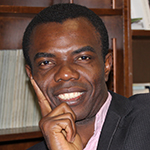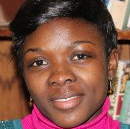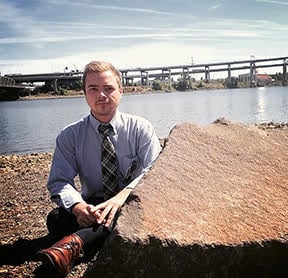
Daniel William Lawrence received his PhD in rhetoric and technical communication from Michigan Technological University in August 2014.
His dissertation, On the Digital-Political Topography of Music, explored the historical relationship between rhetoric and music and re-opened this connection by examining the material and immaterial properties of digital music and its networks of distribution.
His research has been published in Rupkatha Journal on Interdisciplinary Studies in Humanities, Harlot: A Revealing Look at the Arts of Persuasion, and Digital Ethos and Online Credibility: Evaluating Computer-Mediated Communication.
In the fall of 2014 he moved to Portland, OR and began working with Sunbleached Visuals, assisting with music video productions. He is now Marketing & Communications Manager of Melvin Mark Companies where he lends his experience in digital media and analytics to develop marketing collateral and strategies for the firm and its brokerage team.
Performing often along the coast, he plays the guitar in a traditional Irish festival band and mandolin in an alternative-country/mosey group, and appears in and around the city as singer-songwriters Dan Loredo, The Man from Echo Flat, and Lonely Mountain Dog.
His next album, Fallow Lands, is being produced by Christopher Hoganson (Fur Coats, Wampire) and is planned to be released by Portland-based Golden Ghost Records and its affiliate, Famined Records (Winter Park, FL), in 2016, who will fund a modest national tour.
Future research plans include the completion of his monograph, The Citizen Musician: Rhetoric and the Politics of Digital Music, and a glowersome collection of critical essays on digital literacy and urban housing with new data from his CoStar Group research, The Technological Class.
He lives with a coterie of good friends, musicians, and artists in a crumbling mansion in the north of the city and spends much of his time in the woods and mountains.
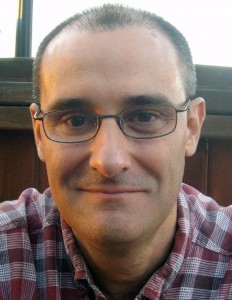
I am an assistant professor in the English and Humanities department at the State University of New York (SUNY) College of Technology at Alfred, more popularly known as Alfred State College. Although my primary teaching area is technical writing and communication, I also teach classes in literature and film studies. I am currently involved in creating a technical communication track in our Bachelor of Technology program as well as developing curriculum for a new major program in English, including courses in writing for emergent media. For updated information on my teaching, research and conference presentations, please visit my faculty webpage at Alfred State’s website.
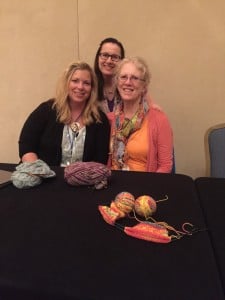
 This year, the SSCA met in Tampa, Florida, and I helped organize a panel presentation that focused on the convention’s theme, Communication as Arts and Craft. Dr. Carrie West (Assistant Professor of Communication Studies, Schreiner University), Professor Sally Hannay (Professor of English, Schreiner University) and I shared collaborative projects and mentoring techniques that evolved around a small roundtable of knitters who all happened to work in academia, our Stammtisch. While Carrie focused on the community of practice approaches of the Stammtisch, Sally shared her pedagogy on how to integrate a service-learning component into her Technical Communication classroom. I then wrapped up our panel by discussing the successes and obstacles when launching an international charity project that is based on grassroots activism. StreetKnits consists of a vibrant community of knitters from various countries (United States, Germany, Spain, Canada) who donate knitwear to homeless shelters in the Midwest.
This year, the SSCA met in Tampa, Florida, and I helped organize a panel presentation that focused on the convention’s theme, Communication as Arts and Craft. Dr. Carrie West (Assistant Professor of Communication Studies, Schreiner University), Professor Sally Hannay (Professor of English, Schreiner University) and I shared collaborative projects and mentoring techniques that evolved around a small roundtable of knitters who all happened to work in academia, our Stammtisch. While Carrie focused on the community of practice approaches of the Stammtisch, Sally shared her pedagogy on how to integrate a service-learning component into her Technical Communication classroom. I then wrapped up our panel by discussing the successes and obstacles when launching an international charity project that is based on grassroots activism. StreetKnits consists of a vibrant community of knitters from various countries (United States, Germany, Spain, Canada) who donate knitwear to homeless shelters in the Midwest.
Our panel was very well received. In fact, an ESL instructor from Georgia might be a new StreetKnitter and plans on starting a similar community outreach project on her campus, linking StreetKnits to refugees.
I also enjoyed several other panels on intrapersonal communication, rhetoric and ethics. Communication Studies is such a multi-facetted field and offers a big variety of exciting talks at a conference. Unfortunately, my flight to Chicago got canceled on Thursday and I did not arrive in Tampa until Friday night which resulted in a very short stay. But my colleagues and I plan on paneling again at next year’s SSCA convention in Austin, Texas, and I plan on submitting a paper on my own as well.
I would like to thank the Humanities Department and the Student Government for making this trip possible. StreetKnits is a project dear to my heart and sharing my ideas with like-minded people was a wonderful and inspiring experience. Also, I would like to thank several faculty members: Dr. Patricia Sotirin, Dr. Jennifer Slack, Dr. Stefka Hristova and Dr. Lauren Bowen have been immensely helpful in assisting me getting started with the IRB process, they introduced me to fellow scholars in the field and they helped me brainstorm about how to build a StreetKnits community at Michigan Tech.

Congratulations to PhD candidate Rebecca Frost, who received a Michigan Tech Finishing Fellowship for summer 2015 to support her dissertation work.
Rebecca Frost is a Michigan native who completed her undergraduate studies at Kalamazoo College (Kalamazoo, Michigan) and Friedrich-Alexander Universität Erlangen-Nürnberg (Bavaria, Germany). She completed her master’s in Rhetoric and Technical Communication from Michigan Tech in 2010, and she is currently working on her dissertation project, Successful True Crime: Serial Killers, Victims, Gendered Bodies, and the Hunt.
This project concerns itself with historical and current impacts of crime narratives in America, focusing on the ways in which crime narratives function as a stabilizing ritual. She hopes that her dissertation will more fully examine the role of crime narratives and the rhetorical strategies within the genre to draw conclusions about American culture and popular beliefs surrounding crime, criminals, and victims, which has impacts for studies of rhetoric, American history, and American culture.
This fellowship gives her the chance to complete more in-depth research, especially primary texts of the eighteenth and nineteenth centuries, and allows her more time to draw together information from various resources that have until now remained separate instead of in conversation.
Thus far she has discovered that many current publications on true crime and crime narratives are not supported by her extended research, and she hopes to produce a dissertation that will have a large impact on future research into crime narratives and representation. The subject of crime narratives and popular consumption thereof covers many fields and extends back to the first publications on American soil, and is thus an interdisciplinary topic of interest to scholars in many fields, and in the future she hopes to expand this impact further into other disciplines that are affected by crime and the popular perception of criminals, including possibly criminology and further into popular culture studies.
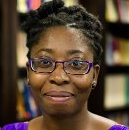
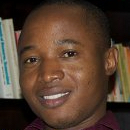
Nancy Henaku and Yunana Ahmed will present papers at the Joint Colloquium of the African Association for Rhetoric and the Humanities Division Common Text Project to be held at Howard University in April 2015.
Three RTC PhD students have received RTC Travel Grants to support their presentations at national academic conferences.
- Jessica Lauer presented her paper, “A Hard Nut to Crack: Material Consciousness and the Nutcracker” at the Society for the History of Technology conference in Dearborn, Michigan in November 2014.
- Keshab Acharya will present his paper, “Usability and Value-proposition Design: Exploring the Nexus between Usability, Technology, and Aging” at the Association of Teachers of Technical Writing (ATTW) Conference in Tampa, Florida in March 2015.
- Silke Feltz will present her paper, “Out of the Armchair and into the Streets: StreetKnits” at the Southern States Communication Association conference in Tampa, Florida in April 2015.
The students also received support from the Michigan Tech Graduate Student Government travel grant program.
The Graduate School and Graduate Student Government proudly announce the 2014-2015 academic year winners.
- Swarup China, Niraj Dhital, Maria Gencoglu, Yaoxian Huang, Nayyer Islam, Ranjeeth Naik, Gaurav Pandit, Rachel Rupnow, Anqi Zhang, Andrew Baker, Mehran Bidarvatan, Luke Bowman, Adam Coble, Ashley Coble, Cynthia Delaney, Kamal Dhugana, Ruilong Han, Weilue He, Brian Hutzler, Shuaimin Kang, Jordan Klinger, Udit Shrivastava, Jun Tao, Bo Zhang
Outstanding Teaching Award recognizing graduate students who have exhibited exceptional ability as a teacher, have received excellent evaluations from students, as well as gaining the respect of faculty in their departments:
- Joel Beatty, Patrick Belling, Caitlin Bulkovitz, Bryan Freyberg, Emily Gochis, Bethany Klemetsrud, Toni Larche, Chelsea Mitchell, Kiley Spirito, Daniel VanSlembrouck, Mehran Bidarvatan, Troy Bouman, LiLu Funkenbusch, John Henderson, Murat Koksai, Madhu Kolati, Connor McCarthy, Ashley Miller, Ethan Novak, Mengmeng Qiao, Jennifer Riehl, Katie Snyder, Jennie Tyrrell, Christopher VanArsdale, Erika Vye, Luting Wang
Outstanding Service Award recognizing excellent service to Graduate Student Government and the University community:
- Zachary Champion, Muraleekrishnan Menon, Samuel Roache
Merit Award for Exceptional Student Leader recognizing the ability to work well with others, participation in extracurricular activities and achievements contributing to the overall graduate student community and representing a bearer of integrity to others:
- Abhilash Kantamneni
Merit Award for Exceptional Student Scholar recognizing excellence in areas such as academic pursuits, publications and presentations, and exceptional work ethic:
- Xu Yang
Merit Award for Exceptional Graduate Student Mentor recognizing advocacy for graduate students, being available and encouraging to students, and creativity/interdisciplinary collaboration in new opportunities for graduate students:
- Gregory Odegard
(This originally appeared in Tech Today.)
